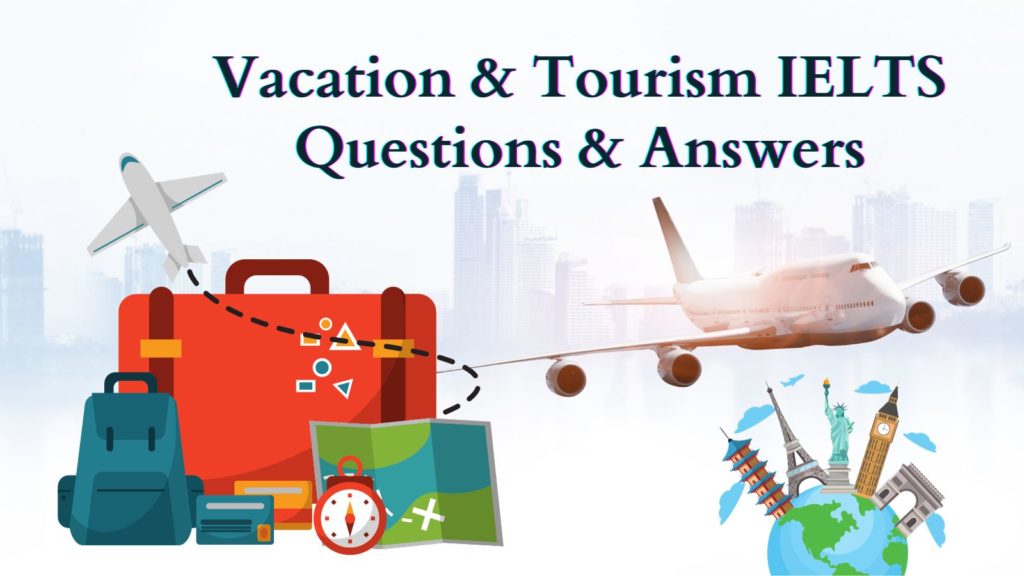In the first part of the IELTS Speaking Test, the examiner asks you general questions from your own experience. Here are some examples of questions for speaking about tourism and traveling.

IELTS Speaking Tourism Part 1
1.Do you enjoy traveling? Why or why not?
Sample Answer
Absolutely! I find traveling to be an enriching experience that exposes me to different cultures, landscapes, and ways of life. It broadens my perspective and provides a break from the routine, allowing me to create lasting memories.
2.Have you ever visited a foreign country? If so, which one(s)?
Sample Answer
Well, I have travelled to Dubai with my family as a child. In fact, we stayed there for a couple of years since my dad got a job there on a contract. Dubai was a great place to visit and stay and we really enjoyed our time there.
3.What types of tourist destinations do you prefer, and why?
Sample Answer
I prefer to visit beautiful hilly areas with natural beauty. That is why when I get a chance I prefer to go to northern side of my country with my family to see the snowfall, enjoy local cuisines and take some hiking trips in the quiet forests.
4.Do you have any near future plans for vacation?
Sample Answer
Well, for my upcoming summer vacation, I am planning to visit “Sawat Valley” which is a beautiful destination. It is sitting at 3,220 feet above sea level and stands out with its cooler and wetter weather compared to the rest of Pakistan. The place is a hit among tourists, thanks to its lush forests, green alpine meadows, and snow-capped mountains, making it one of Pakistan’s top destinations.
5.What are the popular tourist attractions in your country that you would recommend to visitors?
Sample Answer
Hey, if you’re thinking about cool places to check out in Pakistan, I’d totally recommend Swat Valley, Hunza Valley, and the Badshahi Mosque in Lahore. Swat’s got this amazing combo of lush greenery, alpine meadows, and snow-capped mountains – it’s like nature’s paradise. Over in Hunza, you’re in for a treat with stunning views, high peaks, and friendly locals. And Lahore, oh, the Badshahi Mosque is a masterpiece, showcasing our rich Mughal history. Trust me, these spots are top-notch for a memorable trip!
Part 2: Cue Card Questions Tourism IELTS Speaking
In the second part of the speaking test, the examiner gives you a cue card with question and cues written on it. You have one minute time to prepare your answer and 2-3 minutes to speak. Once your preparation time is over, the examiner will ask you to begin your answer. Here is an example of a cue card on the topic of vacation or trip.
Describe a vacation or trip you cannot forget…
- Where and when did you go?
- Who did you go with?
- What did you do during the trip?
- Why was it memorable?
Sample Answer
Sure thing! One vacation that stands out vividly in my memory was a trip to Dubai in the United Arab Emirates. It was back in the summer of 2019, and I went with my family – parents and younger sister. We spent about a week exploring the city and its attractions.
During the trip, we visited iconic landmarks like the Burj Khalifa, the world’s tallest building, and the mesmerizing Dubai Mall. One highlight was our visit to the Dubai Desert Safari, where we experienced thrilling dune bashing, watched the sunset over the dunes, and enjoyed a traditional Arabian dinner under the stars.
The trip was particularly memorable because Dubai offered a perfect blend of modern luxury and cultural experiences. The city’s futuristic architecture, combined with the traditional charm of its markets and cuisine, left a lasting impression. Each day brought new adventures, making it an unforgettable vacation that we often reminisce about.
IELTS Speaking Q/Answers about Tourism Part 3
The third part of the IELTS speaking test is always a discussion part. The examiner will ask you various questions on the main topic, which in this case will be “Tourism”. Here are the kinds of questions.
1.What do you think are the reasons why people enjoy traveling to different countries?
Sample Answer
People love traveling because it gives them a break from daily routine. They get a chance to experience new cultures, taste different foods, and see stunning landscapes. Whether it’s a relaxing beach getaway or an adventure in the mountains, travel breaks the routine and lets you learn and grow. It’s like a personal adventure that broadens your horizons and gives you a break from everyday life.
2.How has the tourism industry evolved over the years?
Sample Answer
Well, back in the day, travel was a fancy thing, only for a lucky few. But now times changed! Thanks to planes, the internet, and cool tech, everyone can be a globetrotter now. You can pick your dream spot, find sweet deals online, and crash at someone’s place through apps. Plus, folks care more about keeping it green and respecting local vibes. After this whole COVID situation, safety’s a big deal too. So yeah, the travel scene has totally shaken up – more accessible, more choices, and a whole lot cooler!
3.What are the potential problems related to tourism?
Sample Answer
Tourism has its share of serious challenges. For example over tourism; It’s when places get too packed, causing environmental damage and littering and making it hard for locals to go about their business.
Now, food … tourists might not have a taste for local foods so it can be challenging for them to find suitable places to find food in a foreign destination.
Jobs for locals can be tricky too, often limited to seasonal work, tied to tourist seasons. Imagine trying to make a living with that uncertainty. Once the season is over, the locals are out of jobs.
Security is a big thing too. Tourists should feel safe, but unfortunately, incidents can happen, impacting the overall trust in a destination.
So, while tourism brings benefits, addressing these serious issues is vital for a sustainable and positive impact on both locals and visitors.
4.Are there any measures that your government is taking to reduce the hazards of tourism on the environment?
Sample Answer
Absolutely! Our government is stepping up to tackle the environmental downsides of tourism. They’re focusing on things like managing waste better to keep our spots clean and green. There are rules in place to make sure businesses go eco-friendly, and they’re looking into ways to control the crowds at popular places. It’s all about making sure our beautiful spots stay that way for future generations.
5.Do you think tourism can help improve the economy of a region or country?
Sample Answer
Oh, totally! Tourism can be a game-changer for the economy. It brings in cash from visitors spending on hotels, food, and cool souvenirs. Plus, it creates jobs, not just in hotels but also in local shops and restaurants. So yeah, tourism can give a nice boost to the wallet of a region or a whole country!
6.In your opinion, what qualities should a good tourist destination have?
Sample Answer
A good tourist spot should have cool things to see and do, like landmarks or nature spots. Easy peasy transportation is a must, so folks can get around hassle-free. Plus, friendly locals make a place feel like home. Oh, and a dash of safety – that’s key. So, a mix of attractions, convenience, friendliness, and safety makes a top-notch tourist destination!
7. Can tourism contribute to the preservation of cultural heritage? How?
Sample Answer
Absolutely! Tourism can play a vital role for the preservation of cultural heritage. When people visit historical sites and museums, they bring in money for their upkeep. That cash helps with restoration and conservation, keeping these cool places alive for future generations. So, tourism becomes a guardian for our cultural treasures!
8.Do you think it’s essential for tourists to learn about the customs and culture of the places they visit? Why or why not
Sample Answer
In my point of view, it might not be essential to learn about the customs and culture of a place but it can be useful to get some knowledge about basic culture of a place beforehand. By which I mean the tourists, with the pre-trip information, will know what to expect in a foreign place from people. It will also help them make connections with people in that particular area.It will also give them more confidence interacting with people. Learning about the customs of a place will make their trip more enriching than just visiting somewhere unprepared and ending up only sightseeing.
The speaking test of IELTS lasts for 12-15 minutes depending on the ability of the candidate to answer the questions. It is important to have prior knowledge of various topics and frequently asked questions in IELTS in order to perform well in the speaking test.
Find more IELTS Speaking Test topics with answers following the link below:

